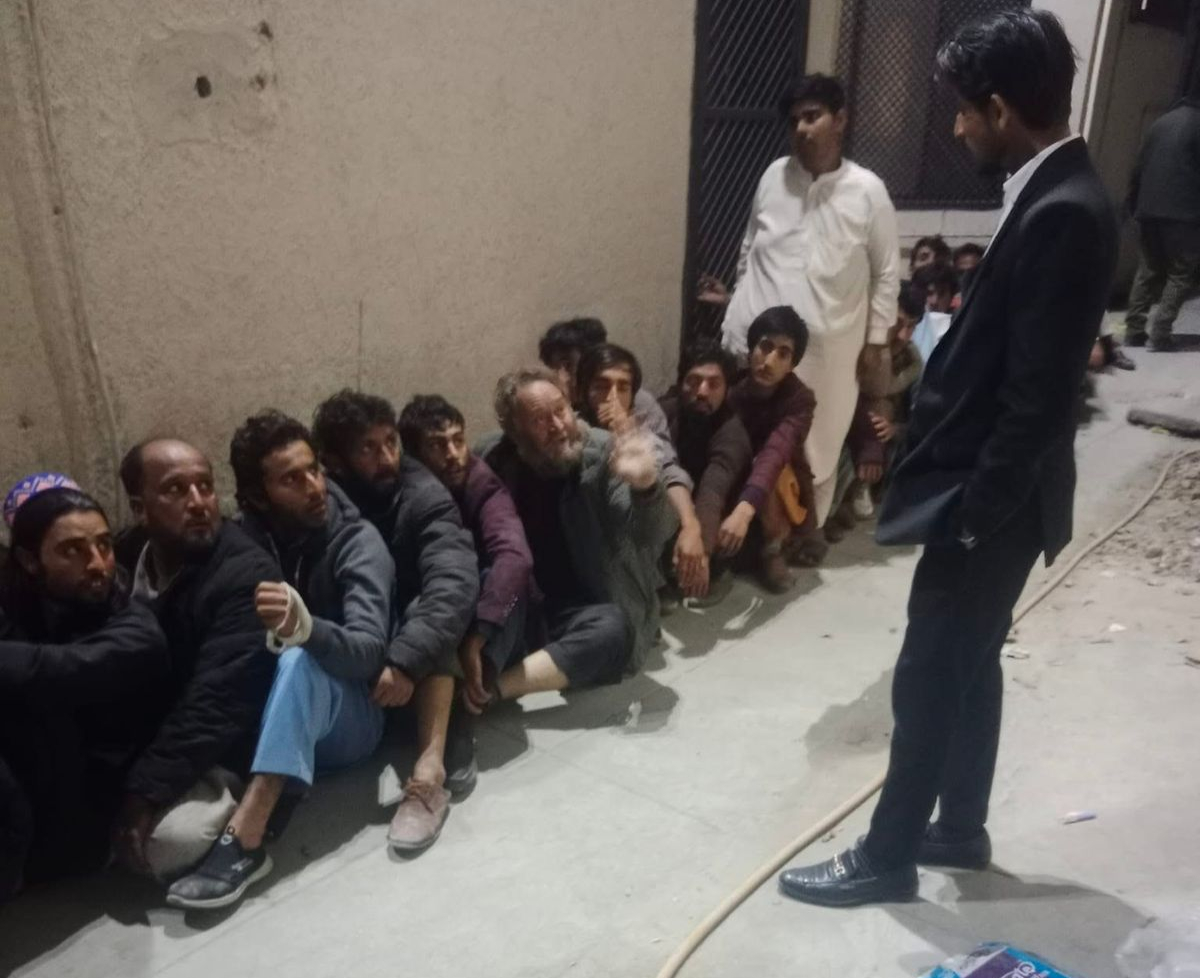Islamabad, Pakistan — Lawyer Imaan Mazari had just got home after getting journalist Matiullah Jan released from the custody of Islamabad police on Nov. 30 when she received a panicked call from the Street Vendors Association of Islamabad, informing her that several vendors had been mysteriously picked up. The police officers she contacted kept denying making any arrests, but the next morning, she found the vendors—most of whom are Pashtun by ethnicity—detained in an Islamabad police station.
They were callously made to sit on the floor of the police station’s courtyard all night, despite the city’s cold weather. The arrests were initially undisclosed, but the police later referenced an old FIR from last year related to the May 9 riots and included the vendors’ names in it.
At the anti-terrorism court, where they were later presented with their faces covered, police officers were seen aggressively encircling Pashtun vendors and separating them from their families after checking their ID cards. When Mazari tried to intervene and stop this racial profiling, an officer shoved her as well.
More than 2,000 Pashtun students, laborers, and street vendors—including legal Afghan refugees—have been arrested and are being held in various police stations in Islamabad and Rawalpindi, according to a list compiled by human rights lawyers, a copy of which is available with Dissent Today. The arrests were made in the wake of Pakistan Tehreek-e-Insaf (PTI)’s long march to the capital last month, seeking the release of incarcerated former prime minister Imran Khan, which ended following the use of force by law enforcement agencies.
Among the arrested street vendors is a 14-year-old boy who sold clothes to support his family.
Mazari told Dissent Today that police officials have been racially profiling and detaining Pashtun journalists as well, after checking their ID cards. “Several journalists and others have told me they were stopped at check posts, and their phones and ID cards were checked,” she said, adding that those whose permanent addresses were in Khyber Pakhtunkhwa were arbitrarily arrested.
Following the racial profiling that Mazari and her fellow lawyers witnessed at the anti-terrorism court, they sat in protest with the Pashtun vendors outside the court. “We could see van after van filled with people arrested from different parts of the city arriving at the anti-terrorism court,” she said.
Two of the street vendors whom Mazari is representing were discharged in the May 9 case, but others are still facing charges. Mazari and some other lawyers were initially unable to reach most of the arrested individuals, which means they remained in custody for days without access to defense counsel.
Mazari says this racial profiling is still ongoing and lawyers are receiving reports of similar arrests almost daily.
For former senator and National Democratic Movement leader Afrasiab Khattak, this racial profiling of Pashtuns is reminiscent of the time when they were displaced from tribal areas during the military action against the Taliban in 2009-2010. “At that time, too, the displaced Pashtuns were labeled as troublemakers who would bring terrorism to Punjab and Sindh,” he told Dissent Today.
The ill-treatment of Pashtun residents in Islamabad comes against the backdrop of widespread anti-Pashtun racist sentiments expressed on mainstream and social media during the PTI protest.
A large number of long march participants marched to the capital from Khyber Pakhtunkhwa alongside the province’s Chief Minister, Ali Amin Gandapur. The PTI’s use of the provincial government’s resources to facilitate its long march has been criticized, but some federal ministers went too far in their criticism by blaming the Pashtun community for the party’s actions. Federal ministers Ata Tarrar and Mohsin Naqvi implied that most participants in the protest were Afghan and, by extension, terrorists.
Khattak says the government has been violently rounding up Afghan refugees and falsely accusing them of participating in the PTI protest. “I know a dozen Afghan refugees who were detained and tortured at the Counter Terrorism Department and forced to confess that they were part of the long march,” he said, adding that federal ministers demonized Afghans as if they were coming from Afghanistan to wage a war on Islamabad.
Meanwhile, PTI leaders had been invoking Pashtun “ghairat” (honor) in the lead-up to the march to urge the people of Khyber Pakhtunkhwa to support the party’s call for protest and march to Islamabad.
Khattak says that the act of invoking Pashtun “honor” for political objectives is a colonial concept introduced by the British. “This stereotyping of Pashtuns as having a keen sense of honor and valor was part of the colonial-era Frontier Crimes Regulations (FCR), which aimed to confine Pashtuns to outdated tribal values,” he said. “The Pakistani ruling elite adopted this stereotype to continue using Pashtuns as cannon fodder.”
In response to a question, Khattak stated that the PTI is not doing enough to assist those who were arbitrarily arrested following the party’s protest in Islamabad. “The PTI claims that more than 200 people are missing, and it has been weeks since this crackdown. What is stopping them from going to the prisons and ascertaining the identities of the arrestees,” he asked.
Mazari agrees that the PTI leadership did not take an effective position on the racial profiling of Pashtuns. “They represent the Pashtun people in Khyber Pakhtunkhwa, and they have a greater responsibility to speak out against the mistreatment of Pashtuns,” she said.
As ministers in the provincial government of Khyber Pakhtunkhwa, including its chief minister, geared up for their long march to Islamabad in late November, the restive district of Kurram saw hundreds killed in sectarian clashes. The death toll from the violence in the district, which continued for weeks, rose to 130 before a ceasefire was recently achieved. The provincial government has been accused of ignoring the crisis and directing its resources toward the PTI march.
“The chief minister of Khyber Pakhtunkhwa has done nothing but squander resources of Pashtuns and their manpower for his party’s battle for the throne of Islamabad,” Khattak says.
But despite this bleak situation, the former lawmaker sees a ray of hope in Khyber Pakhtunkhwa. Referring to the anti-Taliban protests being staged in the province, Khattak said Pashtun citizens have become politically conscious in recent years and are now refusing to be exploited by the Pakistani state and political elites.
“The Pashtun masses have understood that terrorism was brought to their land by the Pakistani state,” he added.
Khyber Pakhtunkhwa Governor and Pakistan People’s Party (PPP) leader Faisal Karim Kundi hosted an All Parties Conference (APC) last week to discuss the deteriorating security situation in the province, attended by every political party except the PTI, which boycotted the event. Khattak, who attended the conference, says everyone present condemned the racial profiling of Pashtuns and the demonization of Afghan refugees.
“Pashtun politicians had to take a clear stance [against terrorism in the province] at the APC because they were feeling the public’s pressure to do so,” he said. “The Pashtun masses have decided they would no longer be used as cannon fodder. It is time for politicians and the state to catch up with this public sentiment in Khyber Pakhtunkhwa.”

The writer is a journalist and the Founding Editor of Dissent Today. She covers politics, human rights, and religious extremism. She tweets at @AiliaZehra.

